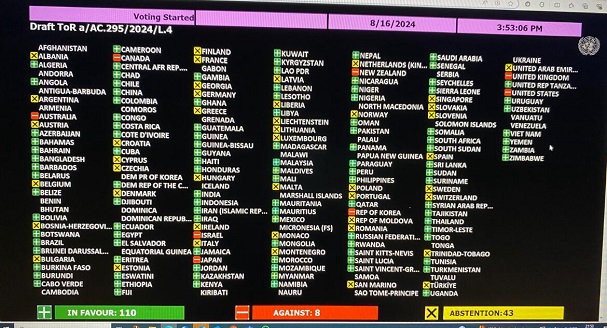BY ANWAR HUSSEN MOHAMMED – On the 16th of August 2024, United Nations (UN) Member States adopted, by an overwhelming majority, the Ad Hoc Committee’s Draft Terms of Reference for a United Nations Framework Convention on International Tax Cooperation.
This historic vote comes almost a decade after the High-Level Panel on Illicit Financial Flows from Africa (HLP), chaired by former South African President Thabo Mbeki, called on Africa to step up efforts to ensure that the UN plays a more prominent role in tacking illicit financial flows.
The HLP Report noted that the issue of illicit financial flows was not firmly on the policy agenda of the UN system. It urged more rigorous efforts in support of a unified global architecture on the issue of illicit financial flows. Led by Nigeria, the Africa Group kickstarted this process in 2022 by spearheading the adoption of UN resolution 77/244 on promoting inclusive and effective international tax cooperation.
Speaking on behalf of the Africa Group during the negotiations, Nigeria hailed the vote as a win for all countries that have fought for an international tax system that is just and inclusive. Nigeria noted that the UN Tax Convention process represents the first time that all UN Member States can come together on equal footing, to create global tax rules. While noting that most of the rules governing international tax cooperation have largely been set up by regional groups, Nigeria highlighted that the UN Tax Convention will be a true global body to deal with international tax cooperation and is not set up to replicate the work of any of these platforms.
The African Group, together with G77 countries, have jointly delivered progressive terms of reference that include the key need to address the issue of fair allocation of taxing rights. This is fundamental to addressing the historical imbalance of taxing rights between developed and developing countries. The terms of reference have also highlighted the need to address the challenges of taxation in a digitalised global economy through the development of early protocols.
The Terms of Reference were adopted with 110 countries voting in favour of the draft. It is worth noting that in 2022, 46 countries voted against Resolution 78/230 but the negotiations of the Terms of Reference saw only 8 countries voting against the process.
TJNA celebrates this milestone and restates our conviction that the UN Tax Convention and related protocols represent our best chance of achieving truly inclusive, efficient and effective international tax reforms. We remain committed to continuing our participation in and supporting this process along with civil society as well as the African Union and other pan-African institutions.

